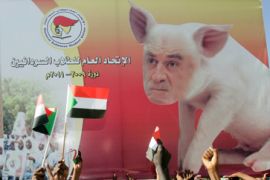Timeline: The ICC and Sudan
A chronology of the International Criminal Court’s involvement in the Darfur conflict.

The International Criminal Court is seeking the arrest of Omar al-Bashir, the Sudanese president, on charges of war crimes and crimes against humanity in the country’s Darfur region.
According to UN estimates, around 35,000 people have been killed there since 2003 and a further 300,000 have died from hunger and disease and some 2.7 million were displaced.
The following is a timeline of the International Criminal Court’s involvement in Sudan over the Darfur conflict:
January-March 2005 – A United Nations report accuses the government and militias of systematic abuses in Darfur, but stops short of calling the violence genocide.
The UN Security Council votes to refer those accused of war crimes in Darfur to the International Criminal Court (ICC), based in The Hague.
| Bashir’s travels | |||||||||||||||||||
|
February 27, 2007 – Luis Moreno-Ocampo, the ICC chief prosecutor, names two war crimes suspects, Ahmed Haroun and Ali Muhammad Ali Abd-al-Rahman, in Darfur. Sudan says the ICC has no jurisdiction.
May 2, 2007 – ICC judges issue their first arrest warrants for the suspects. Sudan rejects the warrants.
July 14, 2008 – Moreno-Ocampo asks judges for an arrest warrant for Omar al-Bashir, the Sudanese president, on crimes of genocide, crimes against humanity and war crimes against the non-Arab ethnic groups in Darfur.
July 16, 2008 – Arab League says it is concerned at moves to indict al-Bashir. African Union later urges UN Security Council to suspend any indictment.
November 20, 2008 – ICC chief prosecutor requests arrest warrants for Darfur rebels for the first time, accusing them of storming an African Union camp and killing 12 peacekeepers.
March 4, 2009 – The ICC issues an arrest warrant for al-Bashir on seven charges of war crimes and crimes against humanity in Darfur, making the Sudanese president the first acting head of state to be indicted. He is also the most senior figure pursued by the court in The Hague since its inception in 2002.
The court rules that al-Bashir cannot be prosecuted for genocide, saying Moreno-Ocampo failed to reasonably prove the Sudanese president had genocidal intent.
Al-Bashir responds by expelling 13 international aid organisations, accusing them of working with the ICC on the arrest warrant. Three local groups are also shut down.
July 3, 2009 – Leaders of the African Union say they will no longer co-operate with the ICC and will not arrest and extradite the Sudanese president.
July 6, 2009 – Moreno-Ocampo appeals the court’s ruling not to prosecute al-Bashir on charges of genocide. He argues that the decision to prosecute al-Bashir for genocide does not depend exclusively on whether it can be proved that the Sudanese head of state had genocidal intentions.
February 3, 2010 – The ICC’s appeals chamber orders the court to reconsider its decision to omit genocide from al-Bashir’s list of charges, saying the initial ruling had been affected by “an error of law” for setting the threshold of evidence too high.
The court’s pre-trial judges will now have to rule again on whether to charge al-Bashir with crimes of genocide.